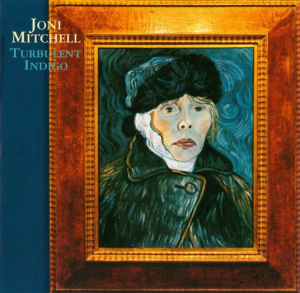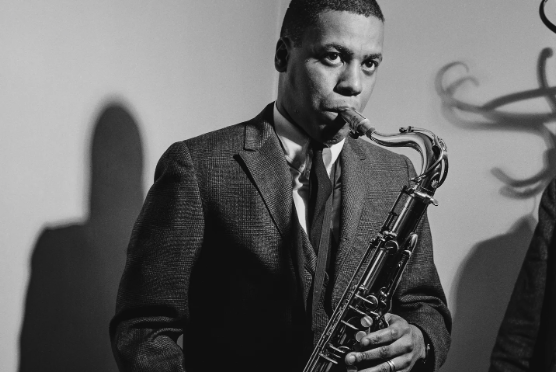
In 1993, Joni Mitchell painted an impressive self-portrait in the style of Vincent Van Gogh, with Joni wearing the same clothes, in the same position, and even with the bandaged ear shown in one of Van Gogh’s most famous self-portraits. The following year, she released an album with this self-portrait on the cover: Turbulent Indigo. The song of the same title is a dark, angry, stunning homage to Van Gogh. Bold strokes of surprising bass, the brooding undercurrents in Joni’s guitar playing and Wayne Shorter’s splashes of golden sax shimmer throughout the song, sparkling as Van Gogh’s yellows do against his swirls of indigo.
Even without lyrics it would be delicious to listen to, with the roiling darkness and the occasional splash of reedy sax, but the words are some of Joni’s best. She taunts the people who know Van Gogh only for his cheering sunflowers and golden wheatfields and who want a mindless, untortured, chirpy version of Van Gogh in their homes, an easy, breezy Vincent. She mocks those who can afford to collect him now, who have his work in their homes and feel as if they’re somehow close to him as a result, but who would have bolted their doors against the actual man, the depressive, angry, brooding Vincent who sometimes fell into bouts of insanity. In the final verse, she lets him speak:
“I’m a burning hearth,” he said” / People see the smoke / But no one comes to warm themselves / Sloughing off a coat / And all my little landscapes / All my yellow afternoons / Stack up around this vacancy / Like dirty cups and spoons / No mercy Sweet Jesus! / No mercy from Turbulent Indigo.”
Some found Joni bold to paint herself into his most pained self-portrait and to allow herself to speak in “his” voice, as if she were equating her genius or her pain to his. The self-portrait is startling, but well-executed and witty; the song is evidence that she is a genius in her own right.
Those who only paid attention to Joni when she had big radio hits in the 1960s and early 1970s but found her too hard to follow during her later, jazz-infused period missed out on a whole world of beauty. The reedy soprano of her “Blue” album (sometimes touching, sometimes too piercing painful for me to listen to) and her marvelous 1974 album “Court and Spark” mellowed over the years into a burnished, glowing alto. I can hear the cigarettes in her voice, which saddens me, but I do love the richness and warmth of the register she slid slowly into over the years like a hot, perfumed bath.
Her lyrics are intricate, dark and sometimes upsetting, but they’re true poetry, not singsongy filler, like so many songwriters’ words. Some work better for me than others; several songs on the “Turbulent Indigo” album have lyrics that feel forced in places (such as “You Were Not to Blame” in which she lashes out at men who abuse women), while one, co-written with her old friend David Crosby, is a real gem: “Yvette in English.” The tune and words are lyrical and lovely, but the lyrics are especially captivating and poetic. Mitchell and Crosby write of a “wary little stray,” a woman who slips into a Paris café and catches the eye of a man who falls for her instantly, taken by her fragility, her insecurity and the delight of dancing with her. We feel his sadness at having her leave him by a “bony bridge between left and right,” one of the lovely, slender bridges that cross the Seine between the left and right banks. The words and images of this song, the rhythms of Mitchell’s guitar, and Wayne Shorter’s ethereal sax floating above it all make it a song I can rarely listen to without listening to it again, immediately afterward, because I so hate hearing it end. A little taste of it:
“Burgundy nocturne tips and spills / They trot along nicely in the spreading stain / New chills, new thrills / For the old uphill battle / How did he wind up here again? / Walking and talking / Touched and scared / Uninsulated wires left bare / Yvette in English going, / ‘Please have this / Little bit of instant bliss.'”
Mitchell writes movingly, painfully, hauntingly about depression and loss. She can write with humor and joy and raw power, too, but the deep understanding she has of difficulty and vulnerability, of those uninsulated wires laid bare, and the way she underscores them with that slightly ravaged voice, those amazing tunings and chord voicings on her guitar, the surprising rhythms, the way she leaves us hanging with unresolved lyrics or chords at the end of a line—she’s so much more than the folkie of “Both Sides Now” or the esoteric jazz fan of her Mingus years.
Wild Things Run Fast from 1982, and Night Ride Home from 1991 are perhaps my favorites among her albums. Wild Things Run Fast was a revelation after hearing the sometimes screechy, folky Joni of the 1960s. It was an delightful, sometimes funny, sometimes pensive mix of rock and jazz and pop, not what I expected at all. Night Ride Home is an album I can listen to endlessly without tiring of it, especially “Passion Play (When All The Slaves Are Free),” a surprising song about the relationship between Mary Magdalen and Jesus; “Cherokee Louise,” about having a best friend from the wrong side of the tracks who lives a life in turmoil; and the lilting, contented “Night Ride Home,” about the joy of riding through a dark night with a lover over the open road, with the thrumming of crickets all around. When I haven’t heard the rolling, insistent guitar that ripples through “Passion Play” for a few months and I listen to it once more, I get chills all over again.
[Revised from an article originally published on Laura Grey’s Little Hopping Bird blog.]


